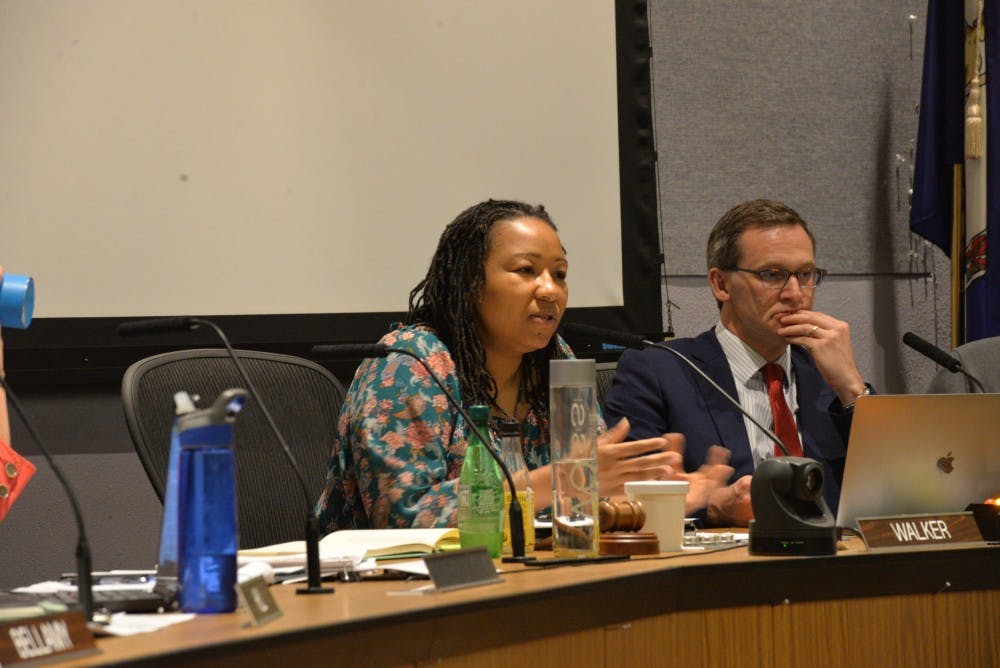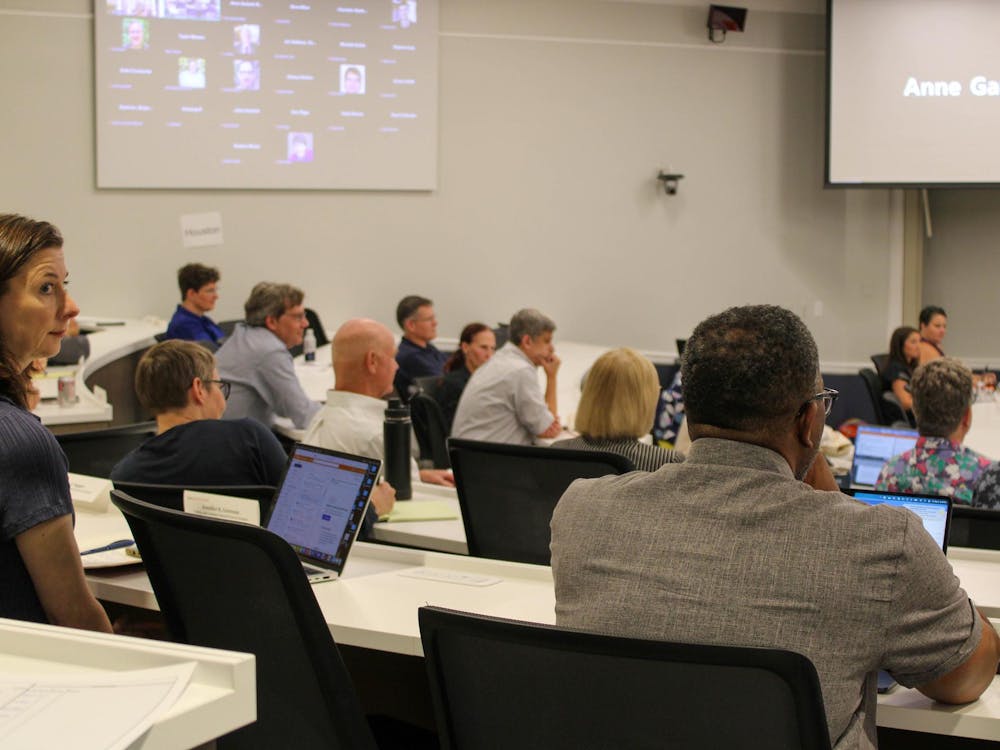Speakers at last week’s meeting of the Charlottesville City Council condemned the response by the City’s police department to a June 8 demonstration protesting the conviction of Corey Long — a counter protester at the Unite the Right rally last August who used an aerosol can as a makeshift flamethrower towards white nationalists shouting racial slurs at him.
The Charlottesville Police Department arrested at least seven individuals June 8, while a group of 20 to 30 activists marched through Downtown Charlottesville in protest of the conviction of Long.
Long was found guilty of disorderly conduct and sentenced earlier that day to 100 hours of community service and 360 days in prison — though 340 days were suspended, and Long is serving 20 in total. The individuals arrested were released by 1 a.m. the following day.
According to a statement by CPD, the protesters veered of the sidewalk and crowded the streets during their march and were asked to clear the roadway by CPD officers. When demonstrators resisted, they were taken into police custody.
One of the individuals arrested was Star Peterson — who is in a wheelchair due to severe injuries she sustained from the car attack at the white nationalist Unite the Right rally last August. The attack also resulted in the death of 32-year-old Charlottesville resident Heather Heyer.
Star was transported to the jail in an ambulance June 8.
At last Monday’s meeting, speakers said the Council should be supportive of the activists who were protesting Long’s conviction and more critical of the police department — even if the operation of the CPD does not fall directly under their control. Currently in the City of Charlottesville, the operation of the police department is subject to the authority of the city manager and the chief of police.
Brendan Hassler, a resident of Albemarle County and a local activist, said the Council should denounce the actions of the CPD and offer to support those arrested in their roles as elected officials.
“That night the community’s real defenders — the people who aim to protect the marginalized members of the community instead of exploiting them — took to the streets to protest this travesty,” Hassler said. “Needless to say, our dearly beloved police force descended … upon this community’s defenders demanding the equitable change in the legal and justice system.”
Hassler said demonstrators were dragged across the street by police officers and added that lawyers were denied entrance into the jail. Local civil rights attorney Jeff Fogel attempted to enter the magistrate’s office in an effort to represent the arrested protesters but was not permitted to enter the building.
“It highlights the double standard in which the CPD treats us as activists — when white nationalists show up with an army, police send a smattering of officers,” Hassler said. “When a smattering of community activists show up for justice, police send an army of officers.”
“The message of the CPD sent that night was clear,” Hassler added. “Demand justice, and we will find any method we can to silence you. It also highlights how the police, the jails [and] the courts work in tandem to protect each other, all at the expense of queer people, poor people and people of color.”
Don Gathers — former chair of the Charlottesville Blue Ribbon Commission on Race, Memorials and Public Spaces and an appointee to the City’s recently formed police civilian review board — said the arrests were unnecessary and excessive. In particular, Gathers criticized the arrest of Peterson as he said an ambulance was dispatched to transport her to the jail.
“It needs to be pointed out that those eight arrests — they were charged with what amounts to jaywalking,” Gathers said. “When in the history of mankind has a paddywagon been called for, [community] members thrown in the paddywagon, for jaywalking?”
In response to the concerns, Councilor Mike Signer said the operation of the City’s police department was not subject to any directive of the Council but the city manager and the chief of police.
“City councilors have no operational role at all in policing decisions like that,” Signer said. “It’s important to understand the form of government we have is council-manager — the entire police system, the police chief reports up to the city manager.”
Signer also said Council meetings are important forums for the public to communicate with its government, but added that the scope of the Council to draft policy or make operational changes with regards to the CPD is limited.
Hassler argued that the Council’s legal inability to control the operations of the CPD should have no bearing upon its ability to support activists taking part in demonstrations.
“Take a stand against the police targeting activists who have materially done nothing wrong,” Hassler said. “You have power just by being elected officials. If the police aren't under your purview, then you have nothing to lose by deploring these actions.”
Mayor Nikuyah Walker said she was not present at the demonstrations, but added that she was in contact with individuals to ensure the safety of the demonstrators.
Moving forward, Walker cited the swearing in of police chief Dr. RaShall Brackney earlier in the day as a positive step towards ensuring police accountability. With the decision of the Council to not renew Maurice Jones’s contract as city manager, the body will also be undergoing the process of hiring a new individual for the position which Walker alluded to in her remarks.
“I think that what is very important to our future regarding this matter … is that we set the tone for how we move forward and what will happen from this day,” Walker said. “Hopefully with the hiring decisions we make in the future — and the one that we've made with our new police chief — that we will have some consistency in response, and we will have a response where community members don’t feel they are battling with the police force that is supposed to protect and serve.”
In relation to the role of the city manager as the overseer of the CPD rather than the Council, Councilor Wes Bellamy reintroduced the notion of implementing a strong-mayor form of government in Charlottesville — which would allow for the mayor to assume many of the administrative powers of a city manager and be directly elected by the public.
Bellamy again requested that the Council consult with Del. David Toscano (D-Charlottesville) and Jones about the process for potentially pursuing such a transition in light of the arrests June 8.
Albemarle County resident Donna Tietjen spoke on the subject during the community matters segment of the meeting, stating that the current council-manager form of government does not allow Walker to fulfill the duties she was elected to carry out.
“This council-manager, i.e. this weak-mayor system of government, cannot get us where we want to go,” Tietjen said. “The council-manager structure reduces Nikuyah’s vision down to one voice in five, and the system itself fractures her authority, slows decision making and skirts broader needs for accountability and ownership.”
Tietjen added that a strong-mayor form of government would hold the elected individual more accountable to the public and allow for greater Council control over city operations, such as the police department.
“It is critical for accountability and change management that we have an elected chief executive who is empowered to make decisions and handle implementation of policies set forth by Council,” Tietjen said.







